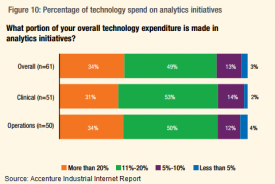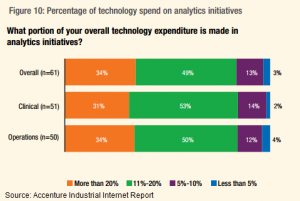57% of Execs Think Analytics is Crucial for Healthcare Revenue

Big data analytics can be an important tool for revenue cycle management during a competitive time for healthcare organizations.
- Healthcare revenue cycle management will increasingly rely on a robust financial analytics infrastructure in the next one to three years, says the majority of executives surveyed in a new GE and Accenture report. Fifty-seven percent of healthcare leaders believe that they can improve their system’s profitability through big data analytics, while nearly three-quarters are concerned that failing to invest in data-driven infrastructure will lead to a loss of market share as they fall behind more forward-thinking competitors.

Healthcare organizations are just at the beginning of the process of harnessing clinical and operational data for quality and cost improvement purposes, but they are starting to make large investments in order to jump-start the analytics process. Just under half of organizations are currently investing between 10 and 20 percent of their overall technology budgets in analytics projects, while 24% have dedicated more than 20 percent of their IT funding to building and deploying data-driven infrastructure.
Executives are pouring such a large amount of money into data analytics because they recognize the crucial role of big data in building and maintaining a reputation for high-quality care that will attract choosy patients, bring top marks on their pay-for-performance contracts, and help to optimize the utilization of resources to control costs, trim excess waste, and improve revenue flow. More than half of providers believe that analytics will bring improved clinical outcomes and patient satisfaction, while 56% are aiming to reduce patient wait times and length of stay. Forty-nine percent think their data can help reduce operating costs through improved asset management.
Providers also believe that there is a sense of urgency to these investments, because their competitors are already on the move. When asked about how they view competing organizations that have implemented analytics technologies, 54% said they think other organizations are already gaining insights into at least one area of their operations. Fifty-two percent believe their competitors are integrating analytics into a quality care improvement strategy, and 44% have publicly stated their intention to optimize operations through big data analytics.
While about a third of organizations currently believe that they are among the leaders in the field when it comes to analytics maturity, there is a pervasive sense of worry that a lack of IT infrastructure as a key tool for scooping up lucrative patients will soon leave the analytics laggards in the dust.
Seventy percent of hospital leaders believe that a failure to adopt analytics within the next three years will stop their organizations from being competitive in the marketplace. Seventy-four percent are concerned about losing qualified talent to competitors who have more successfully positioned themselves as attractive places to grow in data science careers.
Only two percent of providers believe that ignoring analytics will not produce any negative impact on their business prospects, which shows just how much faith the industry is putting in big data to transform the way healthcare provides care, recoups revenue, and operates in an increasingly competitive environment.

